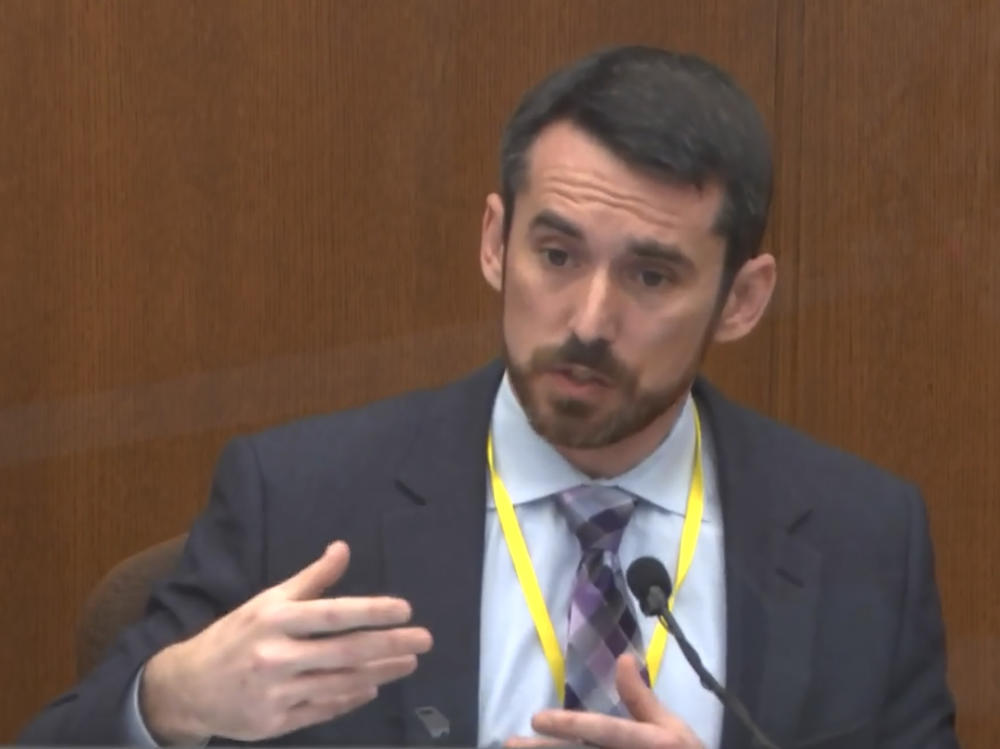Section Branding
Header Content
Chauvin Trial: Expert Says Use Of Force In George Floyd Arrest Was Not Reasonable
Primary Content
Seth Stoughton, a former police officer and use of force expert, told jurors in the murder trial of Derek Chauvin that the actions by the officers involved in George Floyd's killing violated those of a "reasonable officer" throughout the fatal arrest.
Stoughton reiterated many of the findings in his 100-page-plus report, chronicling the pivotal moments in which Floyd's actions affected the officers' response and how what the officers were doing changed Floyd's behavior, as well as the potential threat level of the crowd.
"It's clear from the number of officers and Mr. Floyd's position and the fact that he's handcuffed and has been searched, he doesn't present a threat of harm," Stoughton told jurors after reviewing a brief body cam clip in which Floyd stood in handcuffs flanked by officers beside a squad car.
Stoughton, who is also a law professor, explained the reasonableness standard is a four-step process that determines whether an officer's use-of-force decisions are legitimate and based on "relevant facts and circumstances as seen through the lens of the officer on the scene." In order to assess that, he said, experts consider the threat an officer faces at any given moment, as well as the "foreseeable effects of the use of force."
Despite Floyd's initial resistance to being put in the back of the squad car, Stoughton testified that he did not appear to engage in active aggression toward the officers nor did he indicate any intention of assaulting them.
He added that Chauvin and the other officers engaged in two types of use of force simultaneously: the defendant's knee on Floyd's neck and placing Floyd in the prone position, both of which last for 9 minutes and 29 seconds, according to the body camera video of one of the officer.
An officer's use of force must be reasonable when it starts and must be reasonable throughout its implementation, Stoughton told the court.
"Both the knee across Mr. Floyd's neck and the prone restraint were unreasonable, excessive, and contrary to generally accepted police practices," Stoughton said.
He later clarified that unreasonable force began the moment Floyd was forced to go from a kneeling position into the prone position, and ended when Chauvin's knee was lifted from Floyd's neck and back.
"No reasonable officer would have believed that that was an appropriate, acceptable or reasonable use of force," said Stoughton, who testified that he reviewed all of the available video footage of the incident and prepared for more than 130 hours for the case.
He also testified that the prone position — face down — can be useful for officers trying to handcuff a suspect who may be resisting.
"The prone position is a very useful position in policing for getting control of someone for purposes of handcuffing them," he said.
He added: "When officers are struggling with someone or when they're handcuffing someone they anticipate struggling with, you will often see officers put someone into is that prone position for purposes of handcuffing because it's very difficult for someone to fight or to resist as they're face down on the ground, especially once their arms are out at their sides."
But he stressed that the position is only "supposed to be transitory" and not last for minutes and minutes. "As soon as someone has been handcuffed, you take them out of that position," he explained.
Defense attorney Eric Nelson noted Stoughton's review was conducted under very different circumstances than those faced by Chauvin and the other officers.
"When you do your use of force analysis, you're not doing it in a dangerous situation?" Nelson asked.
"No," Stoughton responded.
Following Stoughton's testimony, Judge Peter Cahill told jurors the defense case will begin on Tuesday and likely wrap up by the end of the day Thursday. He encouraged them to "pack a bag" on Monday, when closing arguments are set to begin, marking the start of sequestration.
Copyright 2021 NPR. To see more, visit https://www.npr.org.

